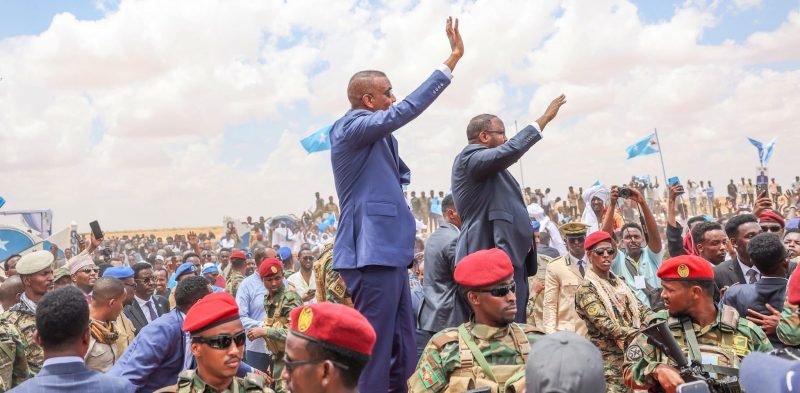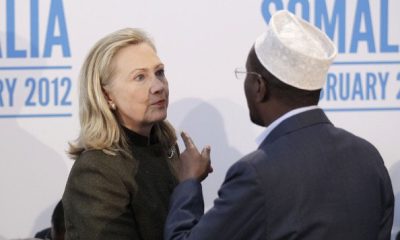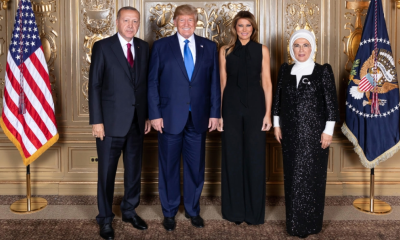Somaliland
Swift Justice in Somaliland: Two Executed for Killing Soldiers

In a stark demonstration of its commitment to strict military discipline and swift justice, the Somaliland government has carried out the executions of two men convicted of killing soldiers in separate incidents in Hargeisa and Gabiley. The executions occurred early this morning near Madheera Central Prison, located in the Sahil region, following their convictions by the Military Court.
The executed individuals, Shibil Salah Isaaq and Mahmoud Ali Nur, were found guilty of the murders of Buux Mawliid Ismail, a police officer in Gabiley, and Major Ali Abdi Nur, the Commander of the Mohamed Mooge District Police Station in Hargeisa, respectively. The decision to carry out the death penalty was expedited at the behest of the victims’ families, reflecting the intense communal demand for justice.
Execution Ordered: Officer Sentenced to Death for Killing Commander
This event marks one of the quickest enactments of capital punishment in Somaliland’s recent history, underscoring the government’s stringent stance on crimes against its security forces. The execution orders were signed by President Abdirahman Mohamed Abdullahi Irro just yesterday, illustrating the government’s process of rapid justice.
In Somaliland, the Military Court maintains a clear directive: immediate execution for any soldier found guilty of killing another soldier. This policy reflects the administration’s rigorous approach to maintaining order and discipline within its ranks. The case of Mahmoud Ali Nur, a soldier who killed his base commander, fell directly under this policy, whereas Shibil Salah Isaaq, a civilian, was subject to a similar swift judicial process due to the gravity of his crime.
This decisive action by Somaliland’s government not only serves as a deterrent against potential misconduct within the military but also signals to the citizens the seriousness with which it upholds law and order. As Somaliland continues to navigate its path as a self-declared independent state, such measures are indicative of its efforts to establish a robust and respected judicial and military system.
Somaliland Police Commander Fatally Stabbed by Officer in Hargeisa
EDITORIAL
Somaliland’s Political Class: Selling Out a Nation for Profit

Somaliland’s greatest obstacle isn’t foreign policy — it’s internal corruption, nepotism, and betrayal from politicians who profit while the nation suffers. WARYATV exposes the rot.
While the people dream of recognition, their leaders cash in on betrayal.
Somaliland’s path to recognition has never been blocked by Mogadishu, Ethiopia, or even the UN. It has been sabotaged from within. Behind the speeches and flag-waving lies an elite class of politicians and businessmen who treat the nation not as a cause to fight for, but as a franchise to milk.
These men—most unelected, many unqualified—have spent decades playing the long game of stagnation. They talk sovereignty while banking silence. They chant patriotism while laundering public funds. And worst of all, they have created a system where anyone smart enough to challenge the decay is labeled a threat.
This is the intellectual apartheid of Somaliland: Educated minds are shunned, sidelined, and smeared because they expose what the ruling class desperately wants to hide—their fear of change, their fear of meritocracy, and their fear of losing control.
The result?
- Corruption reigns unchecked.
- Healthcare and education are abandoned.
- National planning is a joke.
- Recognition is sabotaged deliberately—because an internationally recognized state comes with rules and transparency, and that threatens the clan cartel currently in charge.
Somalilanders aren’t poor because of geography. They’re poor because the elite keep them that way. They’re told to wait, to pray, to believe in “diplomatic progress” while deals are cut behind closed doors and loyalty is bought, not earned. And the biggest betrayal? Business elites who actively oppose recognition, because they fear competition more than they love their flag.
Hadrawi warned us. Intelligence is punished. The thinkers, the visionaries, the honest ones—they are exiled, not by the world, but by their own people in power.
Somaliland isn’t failing because of external pressure. It’s failing because of internal cowardice. A nation hijacked by men who want the title of president, not the responsibility of statehood.
The people must stop idolizing thieves and start demanding truth. Somaliland’s dream is not dead—but it’s being strangled in silence.

Time to break the silence.
EDITORIAL
Donors for Disorder? The Somalia Stability Fund Is Fueling Chaos in Somaliland

UK, EU & US accused of bankrolling instability inside Somaliland under the guise of “Somalia peacebuilding”
Donor Hypocrisy Is Tearing Somaliland Apart. Will Hargeisa Finally Say Enough?
The so-called Somalia Stability Fund (SSF) is emerging not as a vehicle of peace, but a Trojan horse of geopolitical sabotage—financed by global powers that should know better. Under the banner of “stabilizing Somalia,” donor governments including the UK, EU, US, and Scandinavian states are actively funding the creation of a rival administration within Somaliland’s borders.
This is nothing short of foreign-sponsored destabilization.
By pumping millions into the occupied territory project—an entity that exists only on donor spreadsheets and Mogadishu’s delusions—these nations are tearing at the sovereignty of the most stable, democratic and self-governing entity in the Horn of Africa. Somaliland has stood tall for over three decades without terrorism, without foreign troops, and without donor dependency. And now it is being punished for its success.
This is not aid—it’s aggression. This is not peacebuilding—it’s provocation.
Somaliland must act decisively. The government must issue formal complaints to every SSF donor state. If any country is found channeling funds into Somalia’s illegal expansionist agenda within our sovereign territory, diplomatic consequences must follow. Trade relations should be frozen. Embassy activity reviewed. Aid partnerships suspended. No more silent tolerance for backroom betrayal disguised as development.

Donors must now decide: do they back democracy and stability—or fund proxy chaos in the Horn of Africa?
The people are awake. And the era of silent sabotage is over.
Somaliland
Somaliland Ends All Dialogue with Mogadishu After PM’s Provocative Visit to Lasanod

No More Talks with a Failed State.
In a fiery decision, Somaliland officially halts all negotiations with Somalia, condemning the Lasanod visit as a violation of sovereignty. Tensions soar as Hargeisa draws a hard line.

Somaliland to Somalia: Dialogue Is Dead. War Logic Begins.
April 16, 2025, will be remembered as the day Somaliland officially slammed the door on any pretense of peace with Somalia. Following Mogadishu’s calculated provocation — Prime Minister Hamza Barre’s illegal and inflammatory visit to Lasanod — the Council of Ministers has delivered the decision millions had been waiting for: no more talks with Somalia, a regime they now describe as a failed, deceptive, and destabilizing force in the Horn of Africa.
This was not diplomacy — it was an act of political invasion. With that one move, Somalia crossed the red line. And Somaliland, long patient, long restrained, has now responded in kind: no more illusions of dialogue.
Despite President Irro’s repeated gestures of peace — including an inaugural-day olive branch on December 12, 2024 — Somalia’s response was incitement. Now, the gloves are off.
In today’s Cabinet declaration, Somaliland didn’t just cut off talks — it exposed Somalia’s actions as both legally void and morally bankrupt. The so-called “prisoner release” orchestrated by Barre was condemned as propaganda, staged to mask Mogadishu’s collapsing legitimacy. These are not prisoners of war, Hargeisa made clear — they are illegally abducted civilians, and Somalia’s maneuver is a cheap trick to distract from its own imploding statehood.
Meanwhile, Somaliland continues to coordinate with legitimate international partners — including the ICRC, U.S., UK, and UAE — to resolve humanitarian matters in accordance with international conventions, not tribal theatrics.
The real threat now? Somalia’s erratic moves provide fertile ground for terrorists. By militarizing Lasanod and hijacking peace for photo ops, Mogadishu opens the gates for extremist groups to re-enter the scene — endangering not just Somaliland, but the entire Horn of Africa.
With Somalia violating every principle of past dialogue, Somaliland has walked away — not in surrender, but in sovereignty. The nation’s message is thunderous and unambiguous:
“We will defend every inch. We will not negotiate our borders. And we will not recognize a regime that refuses to recognize our right to exist.”
Analysis
America Pulls the Plug on Somalia: UN Funding Blocked, AUSSOM on the Brink

Trump eyes embassy closures as US rejects UN plan to fund peacekeepers in Somalia — Mogadishu’s last lifeline in peril.

The US shocks the UN by rejecting funding for African Union forces in Somalia, just as Trump weighs closing the US Embassy in Mogadishu. With Al-Shabaab advancing and oil politics heating up, is Somalia doomed to implode?
The United States just signaled the collapse of Somalia’s last fragile security architecture — and it did so with chilling clarity. Washington has publicly rejected UN efforts to fund the African Union Stabilization Support Mission in Somalia (AUSSOM), effectively gutting any hope for predictable peacekeeping operations in a country teetering on the edge of collapse.

This isn’t just a bureaucratic snub — it’s a geopolitical death sentence for Somalia. Al-Shabaab militants are already testing the vacuum, launching a multi-pronged assault on Adan Yabaal, a key military base in Middle Shabelle. If confirmed, the town’s fall would mark the largest strategic loss since Somalia launched its offensive against terror in 2022.
UN Secretary-General António Guterres warned the Security Council: no funding, no peace. But the US—under Trump’s second-term posture—is slamming the door shut, labeling Somalia as unfit for a hybrid funding model under Resolution 2719. Diplomats are in a panic. Meanwhile, Trump is reportedly planning to close up to 30 diplomatic missions, with Mogadishu’s embassy topping the list.
Somalia’s response? Desperation disguised as diplomacy. The FGS is now peddling oil blocks in contested territories like Nugaal Valley. In a flashy announcement on X, Somalia’s ambassador to the US declared “Somalia is open for drilling,” targeting American firms with an offer it legally and militarily cannot secure.

Somalia’s Ambassador to the United States, Dahir Hassan Arab
The move comes after Somalia’s recognition of SSC-Khaatumo — a region still engulfed in the political wreckage of its war with Somaliland.
This isn’t about development. It’s about weaponizing recognition, resource manipulation, and fake sovereignty in a bid to win Trump’s favor and undermine Somaliland’s momentum.
But while Hargeisa builds forests and attracts foreign media praise, Mogadishu is drowning in debt, insurgency, and denial. The West is tuning out, and even the UN is losing patience. The US, once Somalia’s diplomatic oxygen, is now pulling the plug.
Somalia is not rising — it’s being unplugged.
Somaliland
President Irro Launches War on Climate Collapse

President Irro marks National Tree Planting Day with the 3,000th tree planting milestone, pledging climate resilience for Somaliland’s future.

Somaliland President Abdullahi Irfan leads the fight against climate change, planting trees to combat deforestation, drought, and rural collapse.
In a region where war, drought, and displacement dominate the headlines, President Irro is planting a different kind of future—one seedling at a time.
Marking Somaliland National Tree Planting Day on April 15, Irfan stood beneath the scorching sun and declared war—not on enemies or insurgents, but on deforestation, climate chaos, and soil erosion. And this wasn’t just ceremony. As he launched the 3,000th tree planting event under the Wadajir and Waxqabad government, Irro signaled a broader vision: fight climate change or watch Somaliland vanish beneath sand and thirst.

His speech didn’t sugarcoat it. From “rising temperatures” and “repeated droughts” to “the displacement of pastoralists” and rural decay, Irro listed every climate blow crushing Somaliland’s future. His response? Restore life through trees. “The lack of trees,” he warned, “is the lack of life.”
The government’s Three Million Tree Planting Project isn’t symbolic. It’s strategic. Reforesting Somaliland means restoring agricultural soil, slowing desertification, anchoring fleeing rural communities, and securing water supplies in a land gasping for it. It’s also political—fulfilling campaign promises with roots in real soil.
But this isn’t just about trees. It’s about rewriting a national doctrine. In a region addicted to short-term conflict fixes, Irfan’s environmental push is revolutionary. He’s betting that climate security will deliver where politics have failed.
Verdict: In a world watching Somaliland for its geopolitics, President Irro is reminding us that the most important front line may not be in Las Anod or Mogadishu—but in the dry, cracked earth beneath our feet.
Somaliland
Blue Cloth of Shame: Khaatumo Militia’s War on Somali Women and Dignity

Held for nearly two years, elderly Las Anod woman becomes the face of a disturbing Khaatumo war tactic unseen in Somali history.
Her name is Cadar — a name that once meant strength and dignity in Las Anod, where she earned an honest living feeding locals in modest restaurants. Today, she stands as a living indictment of the Khaatumo militia’s moral collapse, having survived nearly two years of unlawful captivity in her own hometown.
In all the chapters of Somali history — scarred as they may be by war — there has never been a precedent where an elderly woman was held as a prisoner of war. This is not just unusual. It’s abhorrent. It shatters centuries of deeply rooted cultural values where women, particularly elders, were sacred. Even the most brutal clan conflicts of the past had lines that were not crossed. Until now.
Cadar was one of many reportedly detained by the Firidhiye-aligned forces in Las Anod. Upon their release, these civilian captives were forced to wear blue cloth — a humiliating symbol representing the Somalia flag, and by extension, the failed state her captors claim to represent. The act reeks of psychological warfare. Coercion masquerading as symbolism.
Let’s call this what it is: a war crime.
Not only does it violate the Geneva Conventions, which prohibit political coercion and public shaming of prisoners, it spits in the face of Somali customs, where even during war, the vulnerable were spared.
This was not liberation. It was propaganda in its most grotesque form — a desperate attempt by Khaatumo leaders to rewrite the narrative by parading broken civilians like trophies.
Shame on them.
No flag, no ideology, no rebellion justifies this degradation. What kind of leadership holds grandmothers hostage? What vision of freedom begins by humiliating the very people it claims to protect?
This is not the Khaatumo of public aspiration — this is its ugly, unmasked reality.
Commentary
While Somaliland Sleeps, Puntland Arms Up: UAE Deploys Israeli Radar as Hargeisa Misses the Moment

As the UAE installs advanced Israeli surveillance tech in Bosaso, Somaliland watches from the sidelines—unprepared, uncertain, and strategically sidelined.

UAE quietly deploys Israeli ELM-2084 radar in Puntland, while Somaliland fails to act. Starlink enters Somalia. The Horn of Africa’s new security map is being drawn—and Hargeisa’s not holding the pen.
The Horn’s balance of power is shifting—and Somaliland is missing in action.
In a stunning military maneuver, the United Arab Emirates has discreetly deployed a state-of-the-art Israeli-made ELM-2084 radar system to Bosaso, Puntland—just steps from its air base. The 3D AESA radar, known for tracking drones, missiles, and hostile aircraft with surgical precision, now anchors Puntland’s growing maritime defense grid.
Coordinates don’t lie.
📍 11°16’16.5”N, 49°06’28.3”E — right where Somaliland was supposed to step in.

Sources confirm the UAE and the U.S. had planned this deployment for Berbera six weeks ago. But Hargeisa wasn’t ready. No infrastructure. No green light. No urgency. So the radar—and the opportunity—moved to Puntland.
And that’s not all. Four more radar units are en route.

At the same time, Elon Musk’s Starlink is beaming into Somalia—expanding Mogadishu’s digital reach and strengthening its control of the skies. While Somalia signs deals, coordinates strategy, and expands presence, Somaliland’s diplomatic and security corridors remain stalled, reactive, and exposed.
This isn’t just missed opportunity. It’s national security negligence.
Meanwhile, Somalia is rearming. Turkey is building bases. UAE is choosing Puntland. And Somaliland?
Still waiting. Still hoping. Still unprepared.
As one analyst told WARYATV, “The question is no longer what Israel, UAE, or the U.S. can do for Somaliland. The real question is: When will Somaliland be ready to say yes?”

Editor's Pick
Somalia Declares War with Words: Recognizes SSC-Khaatumo, Sparks Sovereignty Showdown with Somaliland

Barre’s Las Anod visit escalates tensions as Mogadishu officially absorbs SSC-Khaatumo, redrawing the map and triggering a furious response from Hargeisa.
Somalia’s recognition of SSC-Khaatumo as a federal state ignites diplomatic warfare with Somaliland, which calls the move a blatant breach of sovereignty.
What Somalia just did in Las Anod is nothing short of a diplomatic land grab.
In a public ceremony staged in the heart of Somaliland-controlled Las Anod, Somali Prime Minister Hamza Abdi Barre formally recognized SSC-Khaatumo as a federal member administration—a political act that Somaliland’s leadership considers a declaration of war.
“This is not a contested area,” Barre proclaimed, erasing decades of self-governance and territorial control exercised by Hargeisa. But behind the polished rhetoric lies a strategic offensive to reassert Somali federal power in the north—one backed by foreign defense deals, oil ambitions, and electoral manipulation.
SSC-Khaatumo’s leader Firdhiye, once a marginal actor, is now being handed a seat at the high-stakes National Consultative Council (NCC)—Mogadishu’s premier political forum. His inclusion signals Somalia’s intent to institutionalize the partitioning of Somaliland from within.
Barre didn’t come empty-handed. He came with funding promises, construction blueprints, and federal flags—launching new buildings, police HQs, and ID centers. This isn’t development—it’s occupation by bureaucracy.
Somaliland responded with fury, calling the move a blatant violation of sovereignty. And they’re right to sound the alarm. Because if SSC-Khaatumo’s “recognition” is allowed to stand, then the map of Somaliland could be erased by decree—not by war.
But there’s a legal twist. Somalia’s own provisional constitution requires a structured vetting process, which SSC-Khaatumo has not completed. There’s been no parliamentary ratification, no public consultation, no legal framework—just political theatre in a city under dispute.
The timing is no accident. Recognition of Somaliland is gaining steam internationally. This move is Somalia’s desperate attempt to block it—and to insert chaos into Hargeisa’s clearest shot at statehood in 30 years.
Barre’s visit to Las Anod wasn’t just political—it was tactical. Now Somaliland must decide: respond diplomatically—or prepare for a deeper confrontation.
-

 Analysis1 month ago
Analysis1 month agoSaudi Arabia’s Billion-Dollar Bid for Eritrea’s Assab Port
-

 ASSESSMENTS2 weeks ago
ASSESSMENTS2 weeks agoOperation Geel Exposes the Truth: International Community’s Reluctance to Embrace Somaliland as a Strategic Ally
-

 Somaliland3 months ago
Somaliland3 months agoSomaliland and UAE Elevate Ties to Comprehensive Strategic Partnership
-

 Africa1 year ago
Africa1 year agoHow Somaliland Could Lead the Global Camel Milk Industry
-

 Analysis1 year ago
Analysis1 year agoIran escalates conflict, attacking Israel; US forces help Israel to intercept Iranian projectiles
-

 Top stories11 months ago
Top stories11 months agoGunmen Kill 11 in Southeastern Nigeria Attack, Army Reports
-

 Analysis1 year ago
Analysis1 year agoIsrael and Iran on Edge: Tensions Escalate Amidst Rising Threats
-

 TECH11 months ago
TECH11 months agoZimbabwe Approves Licensing of Musk’s Starlink Internet Service





























